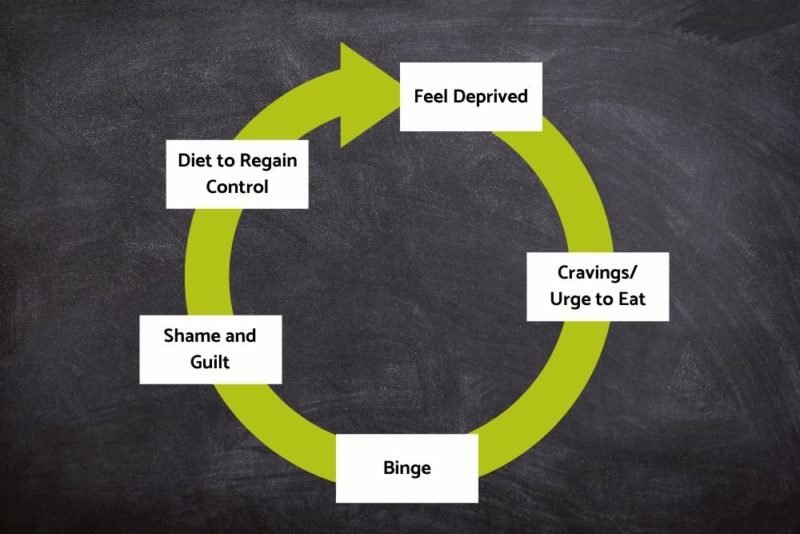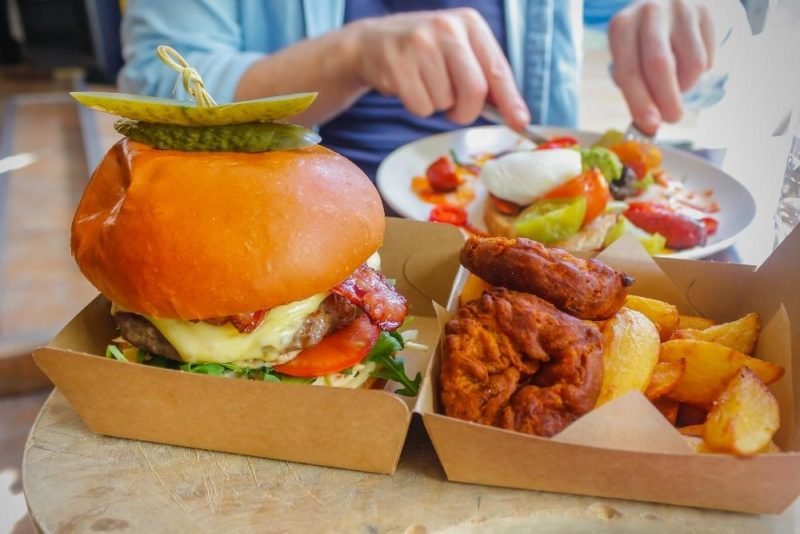
This is the third post in a 10-part series looking at the principles of Intuitive Eating. Last week’s post was on Principle 2: Honor Your Hunger.
OK. Let’s talk about about Principle 3: Make peace with food. This principle is about unconditional permission to eat, and this concept is one where new Intuitive Eaters can get stuck, if they don’t fully understand what this unconditional permission means. First, let’s talk about the elephant in the room…forbidden foods,
I’m sure you’ve heard the expression, “Forbidden fruit tastes the sweetest,” and that’s totally true, whether you’re talking about fruit, or bread, or cake, or any other food that you enjoy but tell yourself you can’t have because of food rules related to dieting or health.
I say “tell yourself” you can’t have the food, because being deprived of a certain food, whether biologically deprived (which means you don’t have access to the food and so aren’t eating it at all) or psychologically deprived, which means you could have the food if you allowed yourself to have it, but your rules don’t allow it, sets up what’s known as the deprivation-rebound pendulum

The deprivation-rebound pendulum
Deprivation is a powerful experience, whether it’s biological or psychological. Unless you’ve experienced poverty or food insecurity, or lived through a famine, you probably haven’t experienced biological deprivation. But if you’ve dieted, whether for weight loss or for “health,” you’ve experienced psychological deprivation.
In last week’s post about honoring your hunger, I explained how becoming primarily hungry can lead to eating that feels or actually is out of control, and a similar thing can happen with psychological deprivation, even if you are honoring your hunger and eating when you are comfortably, not primally hungry.
The moment you banish a food, you start to crave it. The longer you deprive yourself, the stronger the cravings or urges grow, and the less able you are to enjoy a “polite serving” of the food if you were to allow yourself to have it. That’s because you’re stuck in the deprivation-rebound pendulum. This happens when you swing widely from deprivation/restriction to eating in a way that feels out of control.
Another way to describe this phenomenon is with a rubber band. As you restrict calories, carbs or certain foods, the rubber band stretches and stretches. Eventually, it snaps back—or even breaks—and that’s the rebound, which again, may take the form of binging or other degrees of out-of-control eating. And this is a normal biological and psychological response to deprivation.

Fear of future deprivation
Fear of future deprivation, or simply perceiving that food might become off-limits, can trigger eating to a point of feeling overly full, as you go all-in on foods that you think won’t be allowed. I’ve had clients tell me they did this before seeing me for the first time, even though they know I’m a certified Intuitive Eating counselor and don’t put people on diets!
This Last Supper eating is the classic, “My diet starts on Monday” eating, but there are other forms of rebound eating that happen due to this fear of future deprivation.
One is claiming your “fair share,” which is what happens when you are, say, sharing a dessert with someone who eats faster than you, or maybe dining with others in a “family-style” setting. I’ve had clients who have been full-fledged adults for decades and still have a “land grab” mentality with food because they grew up as the youngest of several siblings.
“Return Home” eating is when you overeat foods that have been unavailable. I know that when I travel to Europe I crave peanut butter when I get home, and when I travel to a country where it’s not safe to eat fresh produce—or I visit certain family members who don’t include many vegetables in meals—I crave salads when I get home.
“Empty cupboard syndrome” can happen in response to true food insecurity—it’s not uncommon for families who receive food stamps or rely on food pantries to binge when they finally get to restock their empty fridge and cupboards—but it can also happen when someone doesn’t grocery shop consistently.
Depression-era eating can affect people who lived through the Great Depression as well as those who were raised by people who were. This is one major cause of the “Clean your plate” club.
Once-in-a-lifetime or “one-shot” eating happens when you are enjoying a really special meal, and you realize that you will likely never enjoy this exact same experience again. That can prompt you to eat until you are uncomfortably full, because you are feeling the mental effects of future deprivation.

The habituation response
One big problem with food restriction imposed by dieting is that forbidden-food rules prevent the habituation response. Habituation is what happens when you’re exposed to the same stimulus repeatedly, whether it be food, a relationship or a car, and the novelty starts to wear off. You may still enjoy driving your car, but you’re not as excited as the day you bought it and drove it off the lot.
If you make, say, a tasty soup or stew for dinner and eat leftovers for lunch the rest of the week, after the first few days you probably find that you’re not too excited to eat lunch, even if it’s just as tasty, technically, as it was on the first day. Forbidden foods remain novel and exciting, and this sets up the deprivation-guilt-deprivation cycle, which is pictured above.
The solution is to move towards food neutrality, which strips food of its emotional baggage. This includes stepping back from the idea that certain foods are “good” and other foods are “bad,” because while, for example, broccoli and green jelly beans are both green, they’re clearly not nutritionally equal, but they are morally equal. It includes eating what you really want and includes eating what you really want unconditionally!
Eating unconditionally means avoiding the false permission, or pseudopermission trap, which happens when you put conditions on that permission). For example
- “I’ll allow myself to eat it but I’ll feel guilty about it.”
- “I’ll allow myself to eat it but I’ll do extra exercise tomorrow.”
For a lovely discussion of what habituation to a forbidden food might look like, I recommend listening to the interview with Evelyn Tribole on the “Ten Percent Happier” podcast (Starting at the 43:20 mark, Evelyn helps Dan Harris with his tendency to engage in out-of-control eating with Oreos by working towards habituation.)

Common fears that block the way to food peace
Making peace with food and developing unconditional permission to eat is harder than learning to honor your hunger, which I wrote about in last week’s post. As Evelyn Tribole and Elyse Resch explain in “Intuitive Eating,” his can largely be chalked up to some common fears:
- I won’t stop eating. The reality is that you will stop eating once habituation happens. Low habituation + fear of deprivation = Last Supper Eating
- Self-fulfilling prophecy. In other words, the very thought that you will overeat can be enough to make you actually overeat.
- I’ve already tried this, and it didn’t work (pseudo-permission)
- I won’t eat healthfully. Nutrition may need to go on the back burner during this process. Over time, choices will balance out to include mostly nutritious foods with some “play” foods. Research shows that intuitive eaters tend to eat a more nutritious, varied diet than people who eat based on external rules.
- I don’t trust myself. This feeling can be the result of years of dieting, which teaches us to trust the diet rules rather than ourselves, but it can also stem from early childhood experiences, if your parents had a lot of food rules and you weren’t allowed to regulate your own eating. And this all ties back to the idea of the food police, which I’ll talk about in next week’s post.
To start making peace with food:
- Make a list of foods that are appealing to you, regardless of your thoughts or beliefs about how “healthy” they are. Note which foods you regularly eat, and which foods you try to avoid.
- Choose one “forbidden” food from your list, and go buy it or order it at a restaurant. As you eat the food, check in with yourself to see if it tastes as good as you imagined. (Some people find that the food they placed on a pedestal really isn’t all that once they actually eat it!)
- If you do truly enjoy the food, give yourself continued permission to buy or order the food.

Intuitive Eating is not a free-for-all
At this point, I want to caution you not to fall into one of the mental traps and misconceptions about Intuitive Eating. Namely, that it’s about eating whatever you want and as much as you want whenever you feel like it.
It’s true that many people who start to practice making peace with food after many years or decades of denying themselves certain foods may go through a “Honeymoon phase.” This is a phase where eating feels a little chaotic and out-of-control as someone really embraces allowing themselves to have these forbidden foods.
Ultimately, if you are paying attention to hunger, fullness and satisfaction, eating in an “anything goes” way won’t feel very good. That’s why it’s essential that unconditional permission to eat be paired with attunement. To help yourselves be more attuned, ask yourself these questions:
- How hungry am I?
- What will satisfy me?
- Is the food still tasting good now that I’m halfway through a meal?
- Am I getting comfortably full and need to think about putting down my fork?
- Now that I’m done eating, how do I feel physically?
This taps into Intuitive Eating Principles 5 (Discover the Satisfaction Factor) and 8 (Respect Your Body), so stay tuned! But first, the next post will discuss Principle 4: Challenge the Food Police.
This post contains Amazon Affiliate links. As an Amazon Associate I earn from qualifying purchases.
Disclaimer: All information provided here is of a general nature and is furnished only for educational purposes. This information is not to be taken as medical or other health advice pertaining to an individual’s specific health or medical condition. You agree that the use of this information is at your own risk.
Hi, I’m Carrie Dennett, MPH, RDN, a weight-inclusive registered dietitian, nutrition therapist and body image counselor. I offer compassionate, individualized care for adults of all ages, shapes, sizes and genders who want to break free from eating disorders, disordered eating or chronic dieting. If you need to learn how to manage IBS symptoms with food, or improve your nutrition and lifestyle habits to help manage a current health concern or simply support your overall health and well-being, I help people with that, too.
Need 1-on-1 help for your nutrition, eating, or body image concerns? Schedule a free 20-minute Discovery Call to talk about how I can help you and explore if we’re a good fit! I’m in-network with Regence BCBS, FirstChoice Health and Providence Health Plan, and can bill Blue Cross and/or Blue Shield insurances in many states. If I don’t take your insurance, I can help you seek reimbursement on your own. To learn more, explore my insurance and services areas page.
 Print This Post
Print This Post






